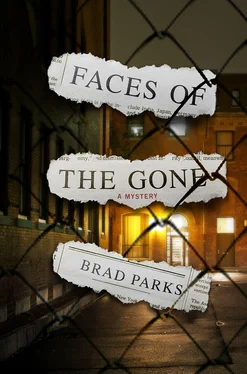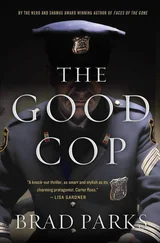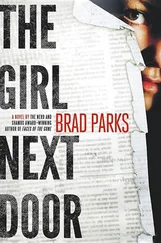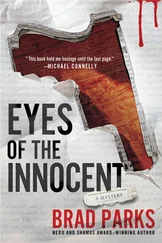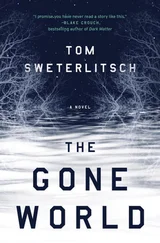Brad Parks - Faces of the Gone
Здесь есть возможность читать онлайн «Brad Parks - Faces of the Gone» весь текст электронной книги совершенно бесплатно (целиком полную версию без сокращений). В некоторых случаях можно слушать аудио, скачать через торрент в формате fb2 и присутствует краткое содержание. Год выпуска: 2010, ISBN: 2010, Издательство: Minotaur Books, Жанр: Триллер, на английском языке. Описание произведения, (предисловие) а так же отзывы посетителей доступны на портале библиотеки ЛибКат.
- Название:Faces of the Gone
- Автор:
- Издательство:Minotaur Books
- Жанр:
- Год:2010
- ISBN:9780312574772
- Рейтинг книги:3 / 5. Голосов: 1
-
Избранное:Добавить в избранное
- Отзывы:
-
Ваша оценка:
- 60
- 1
- 2
- 3
- 4
- 5
Faces of the Gone: краткое содержание, описание и аннотация
Предлагаем к чтению аннотацию, описание, краткое содержание или предисловие (зависит от того, что написал сам автор книги «Faces of the Gone»). Если вы не нашли необходимую информацию о книге — напишите в комментариях, мы постараемся отыскать её.
Faces of the Gone — читать онлайн бесплатно полную книгу (весь текст) целиком
Ниже представлен текст книги, разбитый по страницам. Система сохранения места последней прочитанной страницы, позволяет с удобством читать онлайн бесплатно книгу «Faces of the Gone», без необходимости каждый раз заново искать на чём Вы остановились. Поставьте закладку, и сможете в любой момент перейти на страницу, на которой закончили чтение.
Интервал:
Закладка:
He leaned back in his chair, crossing one thick leg over the other. Even reclined, his stomach spilled out over the top of his belt.
“So, heck of a week, huh?” he said casually.
“Sure was.”
“Your articles have been excellent. You’re really some writer.”
“Thank you.”
“You put certain things together faster than my detectives. Maybe I ought to hire you,” he said, then added a guffaw.
I smiled but didn’t laugh. I usually reserve laughing for things that are, you know, funny. I recognized this as the portion of the conversation where he was trying to establish friendly relations with me. But I wanted to get on to the productive part of the conversation. We each possessed information of indeterminate value to the other. Neither of us would give it up willingly without getting something in return. There would be some bluffing, some casual-sounding questions that weren’t actually so casual, some false leads tossed out there just for fun. I was curious who was going to mention the name Irving Wallace first.
“So, I’ve always wondered this,” Meyers continued. “When you work on a story like that, do you work alone or are you part of a team?”
“If it’s an important story, we usually have several reporters on it.”
“But the person whose name is at the top. They’re the one who knows the most? Or no.”
“The person with the lead byline is the one who has contributed the most reporting. But that can change from day to day, article to article.”
“I see,” Meyers said. “But when you have new ideas, you share them with your fellow reporters?”
“It depends whether you need another reporter’s help in fleshing it out. Sometimes you share, sometimes you don’t.”
“Which was it this time?”
“A bit of both,” I said.
“I see,” he said, again. And I was, quite frankly, a little perplexed by his questions. Had he really brought me here to talk about newspaper politics?
Meyers’s hand was resting on his shoulder holster, his fingers absentmindedly tracing the butt of his gun. Really, why was the gun even necessary? This had to be the most secure building in Newark. Was he worried the janitors were plotting against him?
For that matter, when was the last time he’d used the thing? It made me almost sad for him: the paperwork warrior, still hauling around his piece like he was on the front lines.
“So where has your investigation led you with the Ludlow Street murders?” he asked.
I stared at him, unable to hide my incredulity any longer. “I thought that’s why I was here.”
“Oh?” he said, putting down his legs and sitting up suddenly, like I’d said something to unsettle him.
“Yeah, you called this meeting, right? Or I should say Pete, or Monty, or whatever his name is-he called this meeting. He said you guys had a great story to give me?”
“Oh, yes,” he said, nodding unconvincingly, purposely not looking at me.
“So. .” I began, dragging out the word to indicate it was his turn to talk.
“Well, yes. Your articles have certainly caught our attention,” he said. “And I said to Agent Sampson that you seemed like the kind of person we could trust. I mean, a good reporter is someone you can trust, right?”
“Absolutely,” I said, then pointed to his gun. “You carry that thing. The only thing I come armed with is my credibility.”
“Absolutely, absolutely,” Meyers said. “Tell me, and you can trust me, how did you deduce that this brand of heroin-what is it called, ‘The Stuff’?-how did you figure out that was the connection between all the dealers? It always fascinates me to understand the thought processes a good investigator goes through.”
“Well, Randy, it wasn’t really much of a deduction,” I said, with what I hoped was a patronizing tone. “I’m not an investigator, of course. I’m a newspaper reporter. Which means I’m always trying to tell a story. And to tell a story, you have to keep asking questions until things make sense to you.”
“Of course, of course,” he said. “And then today’s story, that was quite something, you bumping into this young man just hours before he was killed.”
“Yeah, it was something, all right,” I said.
“And he told you how he got recruited in prison?”
“He did,” I said, feeling my annoyance level rise.
“And he had that packet with those photos?”
I nodded.
“Remarkable,” he said.
“Sure was.”
“Did he tell you anything else before he died?”
“What do you mean?”
“Oh, I don’t know. Any theories about who he was working for? Any ideas about who this ‘Director’ guy is?”
“He had theories and I had theories, yeah.”
“Really? What were they?”
Finally, exasperated, I threw my arms in the air.
“Look, Randy, what game are we playing here? Twenty questions for the Eagle-Examiner reporter? Because where I come from, information goes both ways. You show me yours, I show you mine. That kind of thing. If you just hauled me in here to quiz me because your own investigation has stalled, I got better things to do than talk to you.”
“Hold on there, soldier,” Meyers said, holding his hands out like he was a crossing guard.
“I’m not a soldier, and I’m certainly not your soldier,” I shot back. “We can play games with the sourcing and that crap later. Right now, I’m leaving if you don’t answer a very simple question for me: do you know who the Director is or not?”
I stood up to let him know I was serious, putting my fists on his desk.
And that’s when I saw it.
It was just sitting there in plain sight, mixed in with some knickknacks. It was a stamp perched atop an ink pad. You couldn’t see the bottom of it, which would have appeared backward anyway. But on the side of the stamp was a sample of its impression.
It was that unmistakable eagle-clutching-syringe design with the scripted lettering underneath.
It was The Stuff’s logo.
And there was only one person who could be in possession of that one-of-a-kind stamp-the man who had it imprinted on dime bags by the thousand, the man who stamped it at the top of those memos, the man who killed to protect its reputation for unmatched purity.
The Director.
Ilooked across the desk with new eyes. It was the man from Red’s sketch, all right, with his thick neck, fleshy cheeks, and receding hairline. How had I not seen it when I first entered the room?
Because I had fallen into the mistake of believing Irving Wallace, and only Irving Wallace, was my bad guy. Tina had tried to tell me all the ways Wallace didn’t fit, but I wouldn’t listen. Hell, Tommy was telling me Wallace was driving a tan-colored vehicle, and I convinced myself it was really white.
Because I knew it was a fed.
I just had the wrong fed.
Now that I had the right fed-the one sitting in front of me-I realized I had to keep my face straight and talk my way out of the room as gently as I could. I couldn’t let on I knew who he really was.
“Let’s slow down a bit here,” the Director said. “We can keep things cordial.”
“Absolutely,” I said, trying to keep my voice from quavering. “And I’m sorry. Like you said, it’s been a hectic week. You may have heard I lost my home.”
“I did hear that. I’m very sorry about that.”
“I lost my cat, too,” I said. “I loved that cat. His name was Deadline.”
The cat card. I was really playing the cat card again. Anything to cover my retreat.
“Awful, just awful,” the Director said. “I’d like to assure you this agency is doing everything it possibly can to bring the person or persons responsible to justice.”
Читать дальшеИнтервал:
Закладка:
Похожие книги на «Faces of the Gone»
Представляем Вашему вниманию похожие книги на «Faces of the Gone» списком для выбора. Мы отобрали схожую по названию и смыслу литературу в надежде предоставить читателям больше вариантов отыскать новые, интересные, ещё непрочитанные произведения.
Обсуждение, отзывы о книге «Faces of the Gone» и просто собственные мнения читателей. Оставьте ваши комментарии, напишите, что Вы думаете о произведении, его смысле или главных героях. Укажите что конкретно понравилось, а что нет, и почему Вы так считаете.
